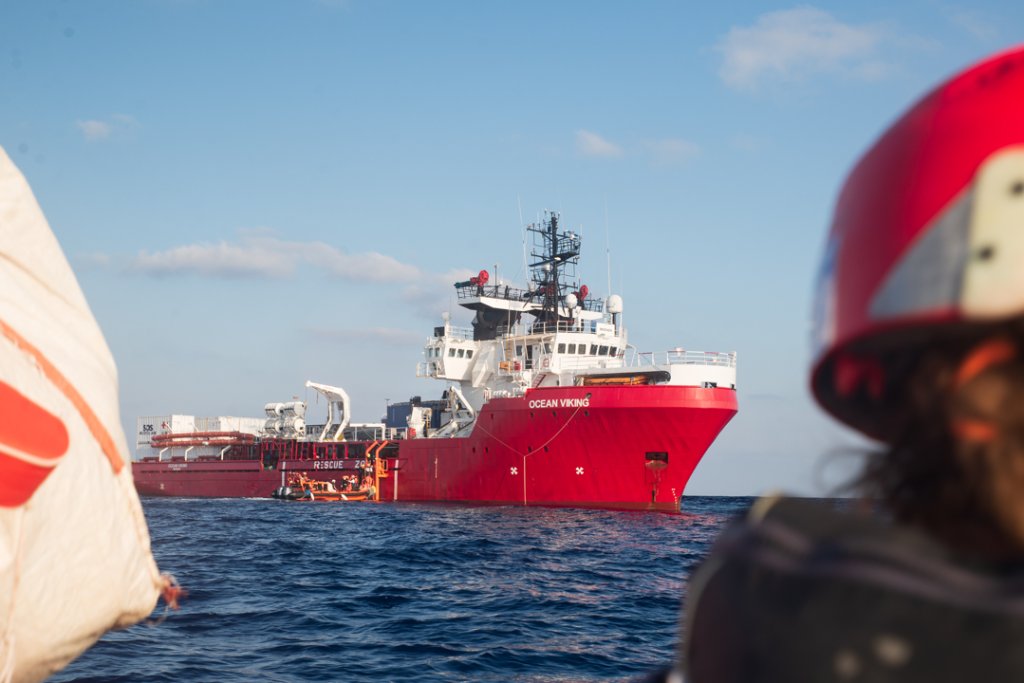Opposition politicians and NGOs have strongly criticized the German government’s decision to suspend financial support to organizations engaged in sea rescue operations in the Mediterranean. They say the move contradicts Germany's human rights commitments.
The German government's decision to halt funding for civilian sea rescue operations in the Mediterranean and beyond has drawn sharp criticism from both politicians and rescue NGOs. InfoMigrants reported the news on Wednesday (June 25).
Green opposition politician Filiz Polat, for instance, called the decision a "fatal signal" that will "cost lives".
"For ten years, civilian sea rescue organizations have been stepping in where the EU fails and saving lives," Polat wrote in a press release reacting to last week's demand by sea rescue organizations for a state-sponsored rescue program for the Mediterranean. "Instead of support, there is obstruction, the arrest of ships and the criminalization of humanitarian aid workers."
Fellow Green politician and member of Parliament Marcel Emmerich said Wednesday's move to suspend financial aid to NGOs saving migrants means that "the deaths in the Mediterranean are condoned, although saving lives is a humanitarian duty."
Migrant rescue NGO SOS Mediterranee Germany, which has been part of the funding program for civilian sea rescue disbursed by the Federal Foreign Office, struck a similar chord.
The decision stands in "stark contrast to the international legal obligations and human rights principles Germany has committed to uphold -- both domestically and on the international stage," SOS Mediterranee Germany told InfoMigrants.
The RESQSHIP organization told InfoMigrants: "This is a political strike against our humanitarian work on the Mediterranean refugee route. The funding we have received to date has helped us in recent months to carry out our operations with the NADIR and to save many people in distress at sea from drowning. This cut in public funding will not mean that fewer people in need will risk crossing the Mediterranean; it will only mean that more of them will not survive the journey.
Read AlsoSea-Watch aircraft discovers five bodies off Libya
Growing impediment to humanitarian assistance
SOS Mediterranee further said that the funding suspension was emblematic of what it called a "deeply concerning trend": That "humanitarian actors, both at sea and on land," are under rising "pressure from political obstruction to administrative hurdles and direct criminalization."
For instance, according to calculations by SOS Humanity, the Italian government's detention of 28 civilian rescue ships has amounted to 680 days of not being able to pursue rescue missions since 2023.

Although 900,000 euros was already reportedly disbursed to non-government organizations involved in sea rescue in the first quarter of this year, the full two million euros previously allocated for this current year will no longer be released.
Since 2022, the German government, through the Federal Foreign Office, has provided annual financial support of two million euros to humanitarian organizations engaged in sea rescue. These organizations included SOS Humanity, SOS Méditerranée, RESQSHIP, Sea-Eye, and Sant'Egidio during the term of Foreign Minister Annalena Baerbock (Green Party).
Criticism of 'pull factor' comments
Germany's foreign minister Wadephul, who had in the past criticized using public money to fund private organizations, on Wednesday said that Germany "will always remain committed to humanity and will always stand up for it in all places where people are suffering".
At the same time, he said he doesn't "believe that it is the task of the Federal Foreign Office to use funds for this form of sea rescue now."
Instead, the Minister wanted to focus on the origin of the refugee movements, particularly in Africa, "using diplomatic means to ensure that such refugee movements can be contained".

Reacting to Wadephul's comments, SOS Humanity criticized the cancellation of two million euros, highlighting it against the 242 million euros the organization claims the EU has spent on border management in Libya and Tunisia over the past ten years.
"It is absurd that so much money is being spent on sealing off Europe while so little money for the rescue of human beings is apparently still too much," SOS Humanity's Managing Director Till Rummenhohl told InfoMigrants.
The NGO also stressed that NGOs' ships do not encourage more migrants to cross the Mediterranean, a claim that Wadephul made in 2023, when he said that he believed "sea rescue organizations were de facto collaborating with smuggling groups and promoting irregular migration to Europe."
"People flee across the Central Mediterranean because they have no alternative to escape war, violence, discrimination, lack of prospects and climate change in their countries of origin, as well as human rights violations and torture in Libya or Tunisia," Rummenhohl said.
As InfoMigrants reported in the past, several studies have indeed found that search and rescue operations do not incentivize migrants to cross the Mediterranean.
Read AlsoSea rescue not a pull factor, says Frontex chief
Pledge to 'continue to save lives'
According to the organization Sea-Eye, none of the organizations affected were contacted before the cabinet decision to cut the funds from the federal budget.
"The loss of over two million euros has a concrete impact on rescue operations and the chances of survival for people in distress at sea," Sea-Eye said in a press statement.
In an email, a spokesperson for Sea-Eye told InfoMigrants that while the budget slash will jeopardize their operational capability in the search and rescue operations in the central Mediterranean, they "will continue to do everything in our power to save lives in the Mediterranean."
"To ensure the safety of those we rescue and our personnel, our missions will continue to be carried out exclusively by fully prepared crews. Until now, we have only been able to carry out our missions thanks to our strong network of volunteer supporters," said the Sea-Eye spokesperson.
At present, 21 organizations are reportedly involved in rescue missions in the Central Mediterranean, ten of them from Germany. Funding for the missions of this 'civil fleet', as it's often called, mainly comes from private donations.
